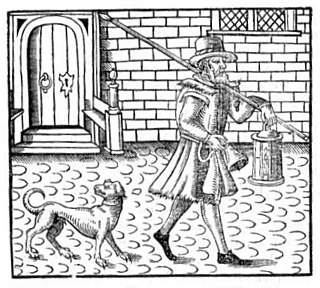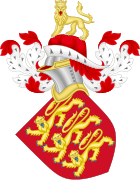Robert Burnell was an English bishop who served as Lord Chancellor of England from 1274 to 1292. A native of Shropshire, he served as a minor royal official before entering into the service of Prince Edward, the future King Edward I of England. When Edward went on the Eighth Crusade in 1270, Burnell stayed in England to secure the prince's interests. He served as regent after the death of King Henry III of England while Edward was still on crusade. He was twice elected Archbishop of Canterbury, but his personal life—which included a long-term mistress who was rumoured to have borne him four sons—prevented his confirmation by the papacy. In 1275 Burnell was elected Bishop of Bath and Wells, after Edward had appointed him Lord Chancellor in 1274.

The Kingdom of England was a sovereign state on the island of Great Britain from 12 July 927, when it emerged from various Anglo-Saxon kingdoms, until 1 May 1707, when it united with Scotland to form the Kingdom of Great Britain, and England is now part of the United Kingdom. The Kingdom of England was among the most powerful states in Europe during the medieval and early modern colonial periods.

The Statute of Westminster of 1275, also known as the Statute of Westminster I, codified the existing law in England, into 51 chapters. Only chapter 5 is still in force in the United Kingdom, whilst part of Chapter 1 remains in force in New Zealand. It was repealed in Ireland in 1983.

Demise of the Crown is the legal term in the United Kingdom and the Commonwealth realms for the transfer of the Crown upon the death or abdication of the monarch. The Crown transfers automatically to the monarch's heir. The concept evolved in the kingdom of England, and was continued in Great Britain and then the United Kingdom. The concept also became part of the constitutions of the British colonies, and was continued in the constitutions of the Commonwealth realms, until modified within those realms.

The Metropolitan Police Act 1829 is an Act of the Parliament of the United Kingdom, introduced by Sir Robert Peel, which established the Metropolitan Police. This was to be responsible for policing the newly created Metropolitan Police District, which consisted of the City of Westminster and parts of Middlesex, Surrey, and Kent, within seven miles of Charing Cross, apart from the City of London. It replaced a previously more diverse system of parish constables and watchmen. It is one of the Metropolitan Police Acts 1829 to 1895.

Watchmen were organised groups of men, usually authorised by a state, government, city, or society, to deter criminal activity and provide law enforcement as well as traditionally perform the services of public safety, fire watch, crime prevention, crime detection, and recovery of stolen goods. Watchmen have existed since earliest recorded times in various guises throughout the world and were generally succeeded by the emergence of formally organised professional policing.

Weights and measures acts are acts of the British Parliament determining the regulation of weights and measures. It also refers to similar royal and parliamentary acts of the Kingdoms of England and Scotland and the medieval Welsh states. The earliest of these were originally untitled but were given descriptive glosses or titles based upon the monarch under whose reign they were promulgated. Several omnibus modern acts are entitled the Weights and Measures Act and are distinguished by the year of their enactment.
The history of competition law refers to attempts by governments to regulate competitive markets for goods and services, leading up to the modern competition or antitrust laws around the world today. The earliest records traces back to the efforts of Roman legislators to control price fluctuations and unfair trade practices. Throughout the Middle Ages in Europe, kings and queens repeatedly cracked down on monopolies, including those created through state legislation. The English common law doctrine of restraint of trade became the precursor to modern competition law. This grew out of the codifications of United States antitrust statutes, which in turn had considerable influence on the development of European Community competition laws after the Second World War. Increasingly, the focus has moved to international competition enforcement in a globalised economy.
Winchester measure is a set of legal standards of volume instituted in the late 15th century (1495) by King Henry VII of England and in use, with some modifications, until the present day. It consists of the Winchester bushel and its dependent quantities, the peck, (dry) gallon and (dry) quart. They would later become known as the Winchester Standards, named because the examples were kept in the city of Winchester.
The history of English land law can be traced back to Roman times. Throughout the Early Middle Ages, where England came under rule of post-Roman chieftains and Saxon monarchs, land was the dominant source of personal wealth. English land law transformed further from the Saxon days, particularly during the post-Norman Invasion feudal encastellation and the Industrial Revolution. As the political power of the landed aristocracy diminished and modern legislation increasingly made land a social form of wealth, subject to extensive social regulation such as for housing, national parks, and agriculture.
Nightwalker statutes were English statutes, before modern policing, allowing or requiring night watchmen to arrest those found on the streets after sunset and hold them until morning. Foremost among them was the Statute of Winchester of 1285 and re-adopted or amended several times until its repeal in 1827 that stated "if any stranger do pass by them, he shall be arrested until morning." Such power was interpreted to extend not only to the watchmen themselves, but also to assistants, and allowed the arrest and detention of all persons.

The Pleading in English Act 1362, often rendered Statute of Pleading, was an Act of the Parliament of England. The Act complained that because the Norman French language was largely unknown to the common people of England, they had no knowledge of what was being said for or against them in the courts, which used Law French. The Act therefore stipulated that "all Pleas which shall be pleaded in [any] Courts whatsoever, before any of his Justices whatsoever, or in his other Places, or before any of His other Ministers whatsoever, or in the Courts and Places of any other Lords whatsoever within the Realm, shall be pleaded, shewed, defended, answered, debated, and judged in the English language, and that they be entered and inrolled in Latin".

The history of law enforcement in the United Kingdom charts the development of law enforcement in the United Kingdom and its predecessor states. It spans the period from the Middle Ages, through to the development of the first modern police force in the world in the nineteenth century, and the subsequent modernisation of policing in the twentieth and twenty-first centuries.

The Treason Act 1547 was an Act of the Parliament of England. It is mainly notable for being the first instance of the rule that two witnesses are needed to prove a charge of treason, a rule which still exists today in the United States Constitution.

The Treason Act 1397 was an Act of the Parliament of England. It was supplemented by six other Acts. The seven Acts together dealt with high treason.

The Statute of Gloucester is a piece of legislation enacted in the Parliament of England during the reign of Edward I. The statute, proclaimed at Gloucester in August 1278, was crucial to the development of English law. The Statute of Gloucester and the ensuing legal hearings were a means by which Edward I tried to recover regal authority that had been alienated during the reign of his father, King Henry III (1207–1272), who had been made a virtual tool of the baronial party, led by Simon de Montfort. Edward I recognized the need for the legal "reform" and considered Parliament as a means of buying popular support by encouraging loyal subjects to petition the King against his own barons and ministers.

The Statute of Northampton is legislation passed by the Parliament of England which met in Northampton in 1328. The parliament also ratified the Treaty of Edinburgh–Northampton which ended the First War of Scottish Independence.

The Statute of Westminster of 1285, also known as the Statute of Westminster II or the Statute of Westminster the Second, like the Statute of Westminster 1275, is a code in itself, and contains the famous clause De donis conditionalibus, one of the fundamental institutes of the medieval land law of England.

The Commons Act 1285 was an Act of the Parliament of England. It was chapter 46 of the Statute of Westminster the Second.









